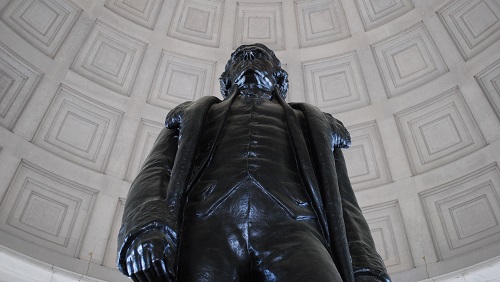Over the last week, I’ve heard several people say things like, “Non-citizens don’t have any rights in America.” Or a variation on the theme “Illegals don’t have rights in this country.”
I find this mentality troubling on two levels.
In the first place, it implies government gives people their rights. You only get ’em if you meet the specified government qualifications.
“Them damn illegals don’t qualify!”
In fact, non-citizens possess every natural right any American has. This includes the right to free speech, self-defense, conscience, etc. To say non-citizens have “no rights,” as some have asserted, is absurd. The Constitution does not “give” people rights. It simply prohibits the federal government from infringing on them.
Natural rights preexist the government and every human being born has them. They make up a basic part of our humanity.
Some people will concede that point, but still insist that non-citizens, or undocumented immigrants, don’t possess the procedural rights guaranteed in the Constitution, such as the right to due process, trial by jury, etc.
Simply reading the Bill of Rights proves this notion wrong. Consider the Fifth Amendment, where we find the procedural right related to due process.
No person shall be held to answer for a capital, or otherwise infamous crime, unless on a presentment or indictment of a Grand Jury, except in cases arising in the land or naval forces, or in the Militia, when in actual service in time of War or public danger; nor shall any person be subject for the same offense to be twice put in jeopardy of life or limb; nor shall be compelled in any criminal case to be a witness against himself, nor be deprived of life, liberty, or property, without due process of law; nor shall private property be taken for public use, without just compensation.”
Notice it does not say “No citizen…” It clearly means any person within the jurisdiction of the U.S. has these basic procedural rights.
Thomas Jefferson made this very argument way back in 1798.
The Alien Friends Act (An Act Concerning Aliens) passed on June 25, 1798, gave the president sweeping power to deport “dangerous” aliens.
It shall be lawful for the President of the United States at any time during the continuance of this act, to order all such aliens as he shall judge dangerous to the peace and safety of the United States, or shall have reasonable grounds to suspect are concerned in any treasonable or secret machinations against the government thereof, to depart out of the territory of the United States, within such time as shall be expressed in such order.”
The act called for imprisonment of any alien who did not immediately comply with the act.
Jefferson vehemently opposed this law, arguing in the Kentucky Resolutions of 1798 that it vested judicial powers in the executive branch and denied such accused aliens basic due process rights in Constitution. Keep in mind, “alien” meant non-citizen.
The imprisonment of a person under the protection of the laws of this commonwealth, on his failure to obey the simple order of the President to depart out of the United States, as is undertaken by said act intituled ‘An Act concerning aliens’ is contrary to the Constitution, one amendment to which has provided that ‘no person shalt be deprived of liberty without due process of law;’ and that another having provided that ‘in all criminal prosecutions the accused shall enjoy the right to public trial by an impartial jury, to be informed of the nature and cause of the accusation, to be confronted with the witnesses against him, to have compulsory process for obtaining witnesses in his favor, and to have the assistance of counsel for his defense;’ the same act, undertaking to authorize the President to remove a person out of the United States, who is under the protection of the law, on his own suspicion, without accusation, without jury, without public trial, without confrontation of the witnesses against him, without heating witnesses in his favor, without defense, without counsel, is contrary to the provision also of the Constitution, is therefore not law, but utterly void, and of no force.”
To deny any human being basic rights walks down a dangerous path. No matter what you might think about undocumented immigrants, they share your humanity and they possess every natural right you do. Moreover, under the U.S. Constitution, they have a guaranteed right to procedural due process along with basic protections from federal infringement of their natural rights.




